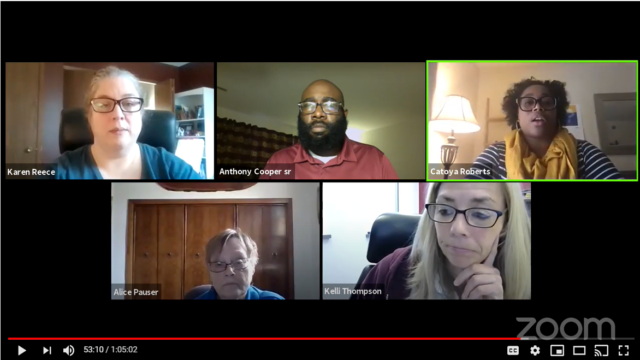The Nehemiah Center for Urban Leadership Development hosted a virtual lunch and learn panel last Thursday and Friday to discuss the criminal justice system in the age of COVID-19.
The two-day series, called “Bridging the Gap: The State of Those Impacted by the Criminal Justice System During The Coronavirus Pandemic,” featured a multi-guest panel of experts across Wisconsin on what they are doing to keep people safe.
The event took the place of Nehemiah Center’s annual Re-entry Conference, which usually assists people who were incarcerated connect with resources and support as they re-integrate into the community. The conference has been rescheduled for September.
Those included in the panel were State Public Defender Kelli Thompson, Dane County Sheriff Dave Mahoney, Catoya Roberts, the national network coordinator for the Advancement project and Alice Pauser, Founder of the Demeter Foundation. Friday’s panel primarily featured Nehemiah’s reentry team.
In Dane County, the sheriff’s office was able to drive down incarceration rates through means such as expanding electronic monitoring and allowing some with short jail sentences to complete their time at a later date. They’ve also examined who was in jail on bail and whether the bail could be referred to a signature bond or a lower bail amount.
“We have been very successful in driving down the incarceration rate from the perspective of our law enforcement agencies,” Mahoney said. “Where we were at the beginning of COVID-19 with a population of just under 800, we’re now at slightly over 400.”
As for the rest of the state, Thompson indicated the different ways in which an individual could be released while in custody, one of which being “compassionate release.” However, the process is difficult and time-consuming.
“The process is not an easy one. You have to get an extraordinary amount of information together, and that’s not easy,” Thompson said. “If we get past that first hurdle, it’s getting to physicians and unfortunately we have two separate physicians: one that has to be a correctional physician and one that’s on the outside. There has to be a hearing that takes place and if you have success, that information all moves to the sentencing judge and we have another hearing in front of a sentencing judge.”
Additionally, Thompson noted, correctional facilities would not be releasing individuals who did not have a plan or a safe place to stay.
The Nehemiah Center works to empower African American families, especially African American males, in an effort to transform the face of leadership in Madison. Through the pandemic, they have used this series to highlight the struggles incarcerated people may be experiencing.
“When I talk to the men who are still in there, they’re very scared,” said Aaron Hicks, Nehemiah’s assistant director for reentry services. “They don’t know if they’re coming home or not. Being mindful of that and being there for the individuals to comfort them can let them know there’s hope at the end of all of this.”
“We’re trying to overhaul a system,” Reverend Dr. Alexander Gee, president and founder of the Nehemiah Center, said. “This is an immense problem, so our solutions cannot be minute. We must be as strategic in dismantling all of this, as those who have been in power were strategic in putting them together.”




























